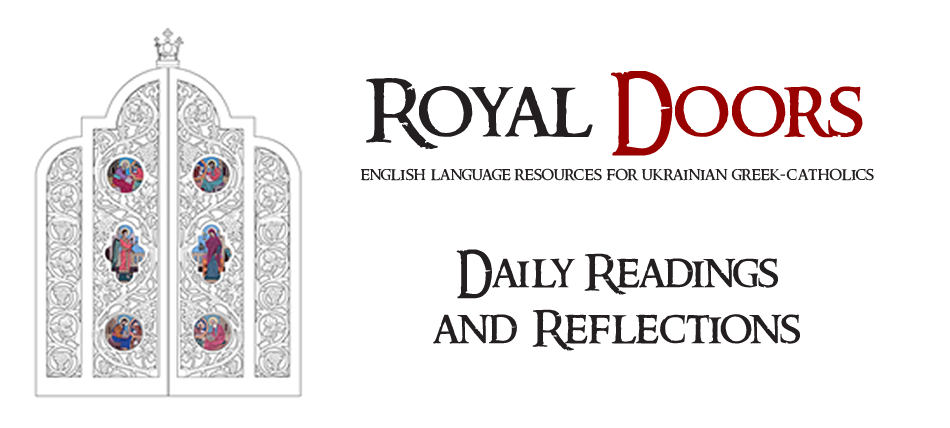by Brent Kostyniuk
In this time of the pandemic, it is normal, if not expected, that people will worry about what lies ahead. For many, the fear of death brought about by this new plague has become a part of everyday life. However, as Byzantine Christians, we know full well what lies in store. At each Divine Liturgy we, along with many other Christians, pray the Nicene Creed and those words which tell us precisely what is in store for us. “I look for the resurrection of the dead and the life of the world to come.”
We are further reminded of this glorious future in St. Paul’s first letter to the Corinthians:
When the perishable has been clothed with the imperishable, and the mortal with immortality, then the saying that is written will come true: ‘Death has been swallowed up in victory. Where, O death, is your victory? Where, O death, is your sting?’ The sting of death is sin, and the power of sin is the law. But thanks be to God! He gives us the victory through our Lord Jesus Christ.
1 Cor 15:54-57
Divinization
Future life begins not at our earthly death, but with the new life, we all begin when we are baptized. For Christians, baptism is not only the beginning of a new life, it is the beginning of a journey towards perfection.
Gregory of Nyssa described the ideal of human perfection as constant progress in virtue and godliness. In Gregory’s theology, God himself has always been perfect and has never changed, and never will. Humanity fell from grace in the Garden of Eden; rather than return to an unchanging state, humanity’s goal is to become more and more perfect, more like God, even though humanity will never understand, much less attain, God’s transcendence. This idea has had a profound influence on Eastern Christian teaching regarding theosis or “divinization.” Theosis is the process of becoming free, being united with God, beginning in this life and later consummated in bodily resurrection. Thus, salvation is a healing process, in which sin is a malady needing treatment.

One of the most often-quoted statements about theosis comes from St. Athanasius of Alexandria. He described the process most beautifully with these words. “The Son of God became man, that we might become god” (the second g is always lowercase since man can never become a God; some translations use “like God”). St. Athanasius draws his inspiration from 2 Peter 1:4: “Through these, he has bestowed on us the precious and very great promises, so that through them you may come to share in divine nature, after escaping from the corruption that is in the world because of evil desire.” St. Athanasius amplifies the meaning of this verse when he says theosis is “becoming by grace what God is by nature.”
Perfection is a Process
Life is, therefore, a constant process of seeking perfection, driving out that which does not come from God. But what happens when we leave this world? Eastern spirituality tells us we each will have travelled a certain distance along the road to perfection, some more than others. There is no theology of purgatory in which some sort of temporary punishment is meted out for sins committed. Rather, we believe theosis continues after death. We enter a state in which we continue to grow, continue to learn, continue to reach perfection. Whether this is instantaneous, or long-lasting is unknown. Ultimately, we reach the perfection required to enter heaven. That process which began when we were baptised continues until its goal is reached.
A Glimpse
On occasion, we may be blessed with a glimpse of what awaits us.
Some years ago, that happened to me after my three-year-old grandson was killed in an early morning traffic accident. Later in the day, I went for my daily run. The usual aches and pains brought on by a lingering injury were compounded by the terrible sorrow I felt. It had been a grey day, with wet snow falling. Now, the storm was abating, but the remaining dreariness matched my mood. Suddenly I was overcome with a sense of peace, an unexpected and unwarranted happiness. At the same time, my physical pain vanished. I felt strong and began to enjoy running as I had not done in a long time. Then, at first, I sensed, then saw, something beside me. There, slightly ahead on the right was Christopher, keeping pace! The image was like light reflecting off water.
Without a doubt, it was him. However, what I saw was not an image of the child I knew and loved. With an incredible sense of wonderment, I realized it was the new Christopher. To digress, if my imagination had simply conjured up Christopher, it would have been as I knew him. Now, the marvellous part. He was not a little boy; he was a grown man, taller than me (I’m 6’2”), yet most distinctly Christopher, with his longish blonde hair. He looked very muscular and handsome, dressed in white. He remained with me for a few moments, then disappeared. However, the amazing sense of peace remained.

I later came to realize Christopher had appeared in his perfected body, the body of the resurrection, the body we all look forward to when we pray the Nicene Creed, a belief confirmed by the developed theology of the patristic writers. I had been blessed not only with knowledge that my grandson was happy, but with a glimpse of what awaits all of us who spend our lives on the path of divinization, of theosis.
If anyone has any doubts about the existence of a beautiful world beyond this one, I can assure there is thanks to the gift of a glimpse of Christopher.
